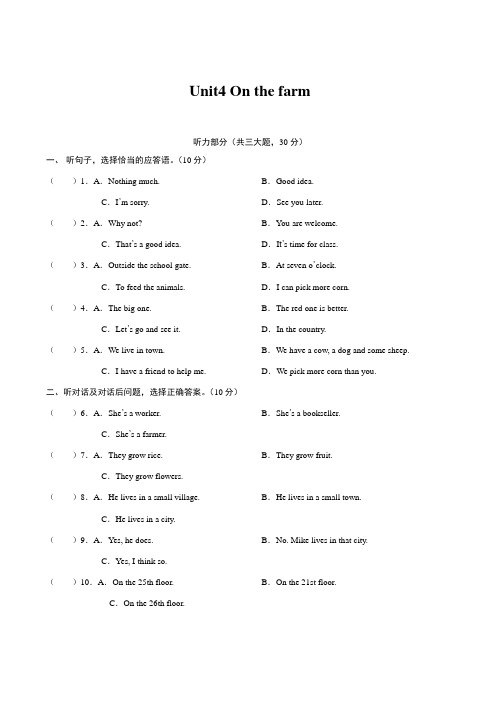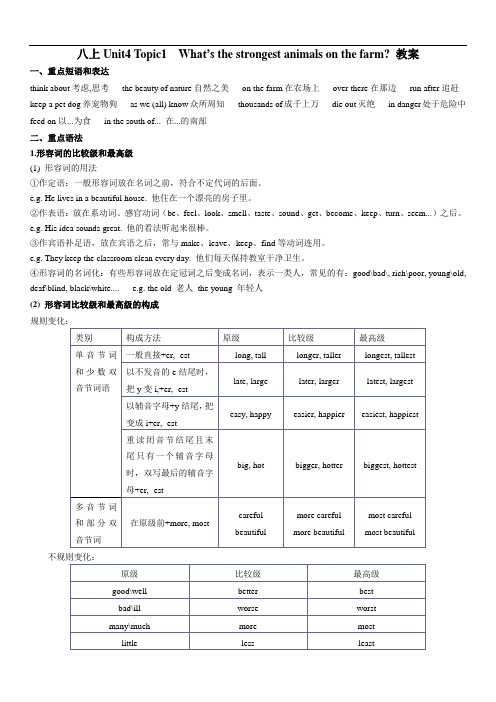八年级上学期英语unit-4-on-the-farm-lesson-13
- 格式:ppt
- 大小:763.50 KB
- 文档页数:18


初二英语Unit 4 On the farm人教版+朗文【同步教育信息】一. 本周教学内容:Unit 4 On the farm二. 重点、难点:1. Let me walk with you. 我和你一起走。
这是个祈使句,let是使役动词,意为“让、使”常构成let sb do sth句式。
let后接省略了不定式符号to的宾语补足语。
句意为使(让)某人做某事,类似这种句式的还有make sb do sth, have sb do sth。
例如:(1)Let’s go swimming tomorrow!(2)Don’t make the baby cry!(3)He has me feed the animals.2. I have to get home to do my homework.have to / has to 表示由于外部环境、情况、习惯等的客观需要,相当汉语中的“不得不”,例如:(1)It’s raining all day, so I have to stay at home.(2)Mary has to study late into night to pass the exam.have to / has to 与must的区别在于must表示说话人的主观意图和要求,意思为“必须”。
如:(3)We must study and work hard.(4)I must do my homework now.get home意为“到家”。
get是不及物动词,home是副词作状语,get后若接名词作宾语时必须加介词to,例如:(1)I get to school at seven every day.(2)When did you get there yesterday?get, arrive, reach三个词均有“到达”之意,区别在于reach是及物动词,后边直接跟宾语,arrive和get都是不及物动词,当表示“到达……地方时”应用arriveat(小地方)或arrive in(大地方),如用get表达需说get to后接地点。

Unit 3 Families Celebrate TogetherLesson 13 I Love Autumn基础篇Ⅰ.根据句意及首字母提示完成单词。
1. Let's c Children's Day together.2. How r and bright the moon is tonight!3. We need to get up early, h , we needn't get up so early.4. I w if you like this gift.Ⅱ.用括号中所给词的适当形式填空。
1. They have been ready to (celebration) the New Year.2. What (China) festivals are in autumn?3. In the US, they celebrate Thanksgiving Day on the (four) Thursday of November.4. I had fun (watch) a football match just now.5. I was (wonder) how to get there quickly.Ⅲ.单项选择( )1. Jim is very clever; ,he doesn't work hard.A. butB. thoughC. howeverD. because( )2. John has fun balls with his friends in the park.A. playB. playsC. playingD. to play( )3. I how you worked out the maths problem.A. wishB. wonderC. agreeD. discuss( )4. We will have a to our success.A. celebrate; celebrateB. celebration; celebrationC. celebrate; celebrationD. celebration; celebrate( )5. -We will have a school trip to Fuzhou City Museum next week.-.And I’m sure you will learn a lot.A. Have funB. Cheer upC. Best wishesD. Never mind( )6. Don’t be angry with him. He is just an boy.A. eight year oldB. eight years oldC. eight-year-oldD. eight-years old ( )7. Thank you your invitation.A. atB. onC. forD. with( )8. -Where did he live before he came here?-He lived in a small village Quincy.A. callB. calledC. callsD. calling( )9. -When do people eat moon cakes in China? -Mid-Autumn Day.A. InB. OnC. AtD. For( )10. I'm glad I with my best friend in the same school next year.A. studyB. will studyC. have studiedD. studied( )11. He is his pen. He is very worried.A. looking forB. find outC. look forD. finding outⅣ.根据汉语提示完成句子,每空一词。

仁爱版英语八年级上册Unit 4 Topic 1 《What’s the strongest animal on the farm》教学设计一. 教材分析《仁爱版英语八年级上册Unit 4 Topic 1》的主要内容是关于农场上的动物以及它们的特点。
本节课的主要目的是让学生掌握有关农场动物的词汇和句型,能够用英语进行简单的交流。
通过本节课的学习,学生能够听懂、会说、会读关于农场动物的词汇和句型,并能够运用所学知识进行简单的描述和交流。
二. 学情分析八年级的学生已经具备了一定的英语基础,能够听懂、说、读、写一些简单的英语句子。
但是,对于一些特殊的动物名称和特点,学生可能还需要进一步的学习和掌握。
因此,在教学过程中,教师需要关注学生的学习情况,及时进行指导和帮助。
三. 教学目标1.知识目标:学生能够掌握关于农场动物的词汇,如cow, horse, pig,chicken, panda等,以及句型“What’s the strongest animal on the farm?”和“It’s… It’s… It can…”。
2.能力目标:学生能够用英语进行简单的描述和交流,能够听懂、会说、会读关于农场动物的词汇和句型。
3.情感目标:通过本节课的学习,学生能够培养对动物的喜爱和保护意识。
四. 教学重难点1.重点:学生能够掌握关于农场动物的词汇和句型,能够用英语进行简单的描述和交流。
2.难点:学生能够正确运用句型“What’s the strongest animal on thefarm?”进行提问和回答。
五. 教学方法1.情境教学法:通过创设农场的情境,让学生在真实的语境中学习和使用英语。
2.任务型教学法:通过小组合作的形式,让学生在完成任务的过程中学习和运用英语。
3.交际式教学法:通过师生互动和学生之间的互动,提高学生的英语交际能力。
六. 教学准备1.教学材料:教材、多媒体课件、图片、卡片等。
2.教学设备:投影仪、计算机、音响设备等。

Unit4 On the farm听力部分(共三大题,30分)一、听句子,选择恰当的应答语。
(10分)()1.A.Nothing much. B.Good idea.C.I’m sorry. D.See you later.()2.A.Why not? B.You are welcome.C.That’s a good idea. D.I t’s time for class.()3.A.Outside the school gate. B.At seven o’clock.C.To feed the animals. D.I can pick more corn.()4.A.The big one. B.The red one is better.C.Let’s go and see it. D.In the country.()5.A.We live in town. B.We have a cow, a dog and some sheep.C.I have a friend to help me. D.We pick more corn than you.二、听对话及对话后问题,选择正确答案。
(10分)()6.A.She’s a worker. B.She’s a bookseller.C.She’s a farmer.()7.A.They grow rice. B.They grow fruit.C.They grow flowers.()8.A.He lives in a small village. B.He lives in a small town.C.He lives in a city.()9.A.Yes, he does. B.No. Mike lives in that city.C.Yes, I think so.()10.A.On the 25th floor. B.On the 21st floor.C.On the 26th floor.三、听短文,根据所听内容选择正确答案。

八上Unit4 Topic1 What’s the strongest animals on the farm? 教案一、重点短语和表达think about考虑,思考the beauty of nature自然之美on the farm在农场上over there在那边run after追赶keep a pet dog养宠物狗as we (all) know众所周知thousands of成千上万die out灭绝in danger处于危险中feed on以...为食in the south of... 在...的南部二、重点语法1.形容词的比较级和最高级(1) 形容词的用法①作定语:一般形容词放在名词之前,符合不定代词的后面。
e.g. He lives in a beautiful house. 他住在一个漂亮的房子里。
②作表语:放在系动词、感官动词(be、feel、look、smell、taste、sound、get、become、keep、turn、seem...)之后。
e.g. His idea sounds great. 他的看法听起来很棒。
③作宾语补足语,放在宾语之后,常与make、leave、keep、find等动词连用。
e.g. They keep the classroom clean every day. 他们每天保持教室干净卫生。
④形容词的名词化:有些形容词放在定冠词之后变成名词,表示一类人,常见的有:good\bad\, rich\poor, young\old, deaf\blind, black\white.... e.g. the old 老人the young 年轻人(2) 形容词比较级和最高级的构成不规则变化:(3) 形容词比较级的用法:两者之间的比较。
①A be +比较级+than Be.g. Mary is taller than Lucy. 玛丽比露西高。
八上Unit4 Topic1 What’s the strongest animals on the farm? 教案一、重点短语和表达think about考虑,思考the beauty of nature自然之美on the farm在农场上over there在那边run after追赶keep a pet dog养宠物狗as we (all) know众所周知thousands of成千上万die out灭绝in danger处于危险中feed on以...为食in the south of... 在...的南部二、重点语法1.形容词的比较级和最高级(1) 形容词的用法①作定语:一般形容词放在名词之前,符合不定代词的后面。
e.g. He lives in a beautiful house. 他住在一个漂亮的房子里。
②作表语:放在系动词、感官动词(be、feel、look、smell、taste、sound、get、become、keep、turn、seem...)之后。
e.g. His idea sounds great. 他的看法听起来很棒。
③作宾语补足语,放在宾语之后,常与make、leave、keep、find等动词连用。
e.g. They keep the classroom clean every day. 他们每天保持教室干净卫生。
④形容词的名词化:有些形容词放在定冠词之后变成名词,表示一类人,常见的有:good\bad\, rich\poor, young\old, deaf\blind, black\white.... e.g. the old 老人the young 年轻人(2) 形容词比较级和最高级的构成不规则变化:(3) 形容词比较级的用法:两者之间的比较。
①A be +比较级+than Be.g. Mary is taller than Lucy. 玛丽比露西高。
【模拟试题】一. 根据英文释义和所给首字母写单词:1. f give food to2. g plant3. f go after4. v go to see; go to(a place)for a time5. j piece of work二. 用所给单词的适当形式填空:1. She has a brother with her. (live)2. His patents grow corn and wheat. They’re .(farm)3. Peter can finish the work of all the workers.(quickly)4. How many can you see at the foot of the hill?(sheep)5. She often buys toys for her little son.(animal)三. 根据所给句子的含义在空格内填入恰当的词:1. Don’t go out of the bus it has stopped.2. Of all the drinks, I like water .3. India is an old country. Can you say about it?4. —What do you want to after you leave school? —A PLA man.5. Everything fast in summer.6. Life in the city is more interesting than life in the .7. The food is good, it’s .8. Thanks giving often es in September or .9. May I have a ? Mum!10. They have a good on their farm this year.四. 用适当的介词或副词填空:1. Aunt Peggy lives a farm.2. Would you like to have supper us?3. Ji Wei likes to look the blue sky after he finishes his farm work.4. Look! The cat is playing a ball.5. John wants to go to college after he leaves school. Does Ji Wei agree him?6. Can you say something a Chinese farm?7. Children like to swim in the river summer. But it’s too dangerous(危险的).8. What are you going to do the day tomorrow?9. Tom has lots friends in China.10. Are the students from Class Two going to Huashan their field trip?五. 选择填空:()1. Kate is short, but Angela is than Kate.A. shorterB. tallestC. highD. long()2. The second truck is carrying baskets than the first.A. fewB. a fewC. fewerD. fewest()3. You pick more corns. But are better than .A. my, yoursB. mine, yoursC. mine, yourD. my, your ()4. Who has apples, Kate, Jim or Meimei?A. someB. a lot ofC. moreD. the most ()5. This room is bigger than that one.A. veryB. quiteC. tooD. much()6. —Which ladder(梯子)is much longer?—.A. That one is long than this oneB. That one is longer than this oneC. That one is longest than this oneD. That one is the longest of all ()7. This story is interesting than that one.A. muchB. moreC. mostD. the most()8. He is busy(忙). He home to do his work.A. has to get toB. have to getC. has to getD. have get to()9. can help the farmers do the farm work on American farms now.A. TractorsB. AnimalsC. Ji WeiD. Dogs()10. You can see many farms in the .A. cityB. townC. countryD. college()11. always es in November(11月份)in China.A. SpringB. SummerC. AutumnD. Winter()12. Can you hear the birds in the tree?A. singingB. singsC. are singingD. to sing()13. —What do children like doing in summer?—They like water.A. to playB. play withC. playingD. playing with()14. We can see many at night.A. cornsB. taxisC. starsD. moons()15. “Give the animals something to eat” means “ the animals”.A. helpB. feedC. growD. hear()16. We must the teacher carefully in the class. Then we can what he is saying.A. hear, listen toB. listen to, hearC. hear, hearD. listen to, listen to ()17. In Lesson 14, Cody is .A. a dog’s nameB. a boy’s nameC. the name of a farmD. the name of a lake()18. —Why do you like dogs?—They are very .A. goodB. excitingC. friendlyD. delicious()19. We can grow on the farm.A. cowsB. tractorsC. wheatD. fish()20. I often do my homework late in the evening.A. forB. atC. toD. until()21. —Who often helps Li Lei with her English? — .A. Lucy doesB. Lucy helpsC. Lucy isD. It’s Lucy()22. some students in the classroom.A. There beB. There isC. There must beD. There will()23. —Would you like to watch a basketball game? — .A. I likeB. I’d likeC. I’d loveD. I’d love to()24. I have a lot of homework to do today.A. everyB. veryC. muchD. quite()25. Sandy busy these days?A. DoesB. IsC. HasD. Are()26. nice to meet you.A. I’mB. We’reC. It’sD. They’re()27. —Who on the bus? —Jim .A. gets, isB. getting, isC. is getting, isD. does getting, does()28. The big truck can carry more apples than the small one.A. muchB. veryC. quiteD. many()29. We are going to help them their .A. with, worksB. doing, workC. do, workD. to do, works()30. My clothes cheap, but very .A. is, nicerB. are, nicerC. is, niceD. are, nice()31. me, working is than all the other things.A. For, the most importantB. For, much importantC. To importantD. To, more important()32. Who can do work on the farm?A. manyB. muchC. moreD. the most()33. We can see lots of stars the sky night.A. in, inB. in, atC. on, atD. on, in()34. It’s thing for me in the country.A. a exciting, to liveB. the most excited, livingC. an exciting, to liveD. a very exciting, live六. 根据句意,用所给动词的正确形式填空:1. My parents are (cook)at home.They are (make)a birthday cake for me.2. —John! What are you (do)tomorrow afternoon?—I (see)my aunt in the country.3. This ruler is broken. Why don’t we (buy)another one?4. Kate (watch)TV every evening. She (watch)TV now.5. Many old people like (walk)after supper.6. My sister is good at (swim).7. Miss Zhao, could you help me (carry)the bag?8. I get up early. Mum (get)up earlier.9. I (not agree)with you. I think living in the country is more interesting than living in town.10. Would you like (e)over to my house tonight?七. 阅读理解:根据短文内容在空白年填写一个完整正确的单词。